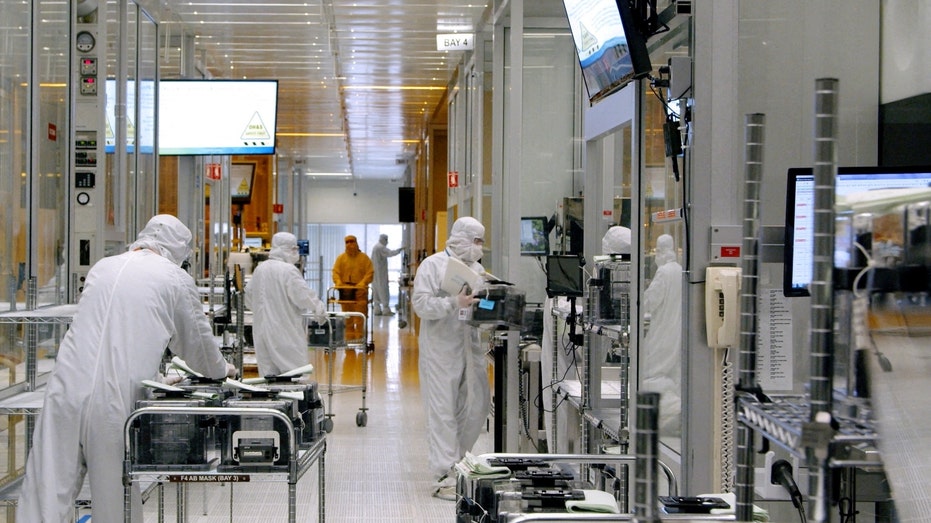US’ tripartite chip alliance should spook China
Deal with Japan, Netherlands sends strong signal on allied unity, and could complicate further expansion plans in China
Chances of China-Taiwan conflict ‘very high’ if Biden continues to project ‘weakness’: Rep. Michael McCaul
Rep. Michael McCaul, R-Texas, discusses the future of the U.S.’s relationship with China along with the economic implications of the debt ceiling conflict on ‘Fox News Sunday.’
The Biden administration’s successful effort to bring Japan and the Netherlands on board with its chip-sector export restrictions to China is a victory for U.S. diplomacy. But sustaining the strategy will require serious work.
Japan and the Netherlands agreed on Friday to join the U.S. in limiting exports of advanced chip-manufacturing equipment to China. The three countries dominate the manufacturing of equipment for advanced semiconductors, so the plan could make it even harder for China to develop its own chip industry.
Japan and the Netherlands are particularly dominant in a manufacturing process called lithography: using light to print tiny circuits on silicon wafers. Dutch manufacturer ASML essentially monopolizes the production of equipment needed for the process called extreme ultraviolet lithography, or EUV, used to make the most cutting-edge chips. It has already stopped shipping EUV machines to China.
But since the Biden administration expanded its chip-related curbs on China in October, some older Dutch and Japanese technologies may also need to be restricted to make the U.S. measures effective—and avoid forcing U.S. companies to absorb the impact alone. Japan’s Nikon competes with ASML in supplying parts for a technological process called deep ultraviolet lithography, or DUV, which is one step less advanced than EUV. Friday’s agreement likely will restrict Japanese and Dutch companies from shipping at least some models of DUV machines.

President Biden departs the White House on September 09, 2022 in Washington, DC. Biden is traveling to Ohio to participate in a groundbreaking ceremony at a new Intel semiconductor manufacturing facility. (Photo by Kevin Dietsch/Getty Images) (Photo by Kevin Dietsch/Getty Images / Getty Images)
YELLEN PUSHES COMPETITION, NOT CONFLICT WITH CHINA, IN HER FIRST IN-PERSON MEETING WITH COUNTERPART
The silence from the Dutch and Japanese governments so far about the actual details of the deal is telling, though. The two countries likely fear blowback from China, which has been a big customer of chipmaking tools. Even though it hasn’t shipped its $150 million EUV machines to China, around 14% of ASML’s system sales in 2022 came from the country. There may also be some remaining disagreements with the U.S. on how far restrictions should go.
The initial effect will likely be limited—although it could seriously complicate efforts to build new facilities near the cutting edge, and might also pose a challenge for servicing some existing parts. But unlike previous unilateral fusillades, the U.S. has finally managed to persuade its allies to sign up for its strategy to contain China’s chip ambitions. That in itself is notable, especially as Europe and the U.S. are embroiled in a separate dispute over the Biden’s administration’s green technology subsidies.

Workers work inside the clean room of U.S. semiconductor manufacturer SkyWater Technology Inc where computer chips are made, in Bloomington, Minnesota, in April, 2022 in this handout picture acquired by Reuters on July 19, 2022. SkyWater Technology/H (REUTERS/File Photo / Reuters Photos)
US COULD QUICKLY RUN OUT OF MUNITIONS IN CONFLICT WITH CHINA, DEFENSE INDUSTRY UNPREPARED: REPORT
And there could be more levers to pull if the U.S. and its allies agree to step up their restrictions on China even further. Some analysts think the current curbs may not go far enough: Blocking the shipment of new tools to China won’t be sufficient because the country can still use its existing machines, said SemiAnalysis’s chief analyst Dylan Patel in a newsletter. He suggests limiting shipments of photoresist, a light-sensitive material used in lithography, for example. Japanese companies are leaders in manufacturing the material. Japan’s Tokyo Electron is dominant in making equipment that coat and develop photoresist on silicon wafers.
CLICK HERE TO GET THE FOX BUSINESS APP
Instead of fighting a unilateral technology Cold War with China, the U.S. is wise to ask its allies for help. These latest restrictions won’t completely hamstring China’s chip industry, but they send a strong signal of allied unity, and could even presage further measures to come. For Beijing and China’s chip aspirants, that may be the most worrying aspect of this latest salvo.




















